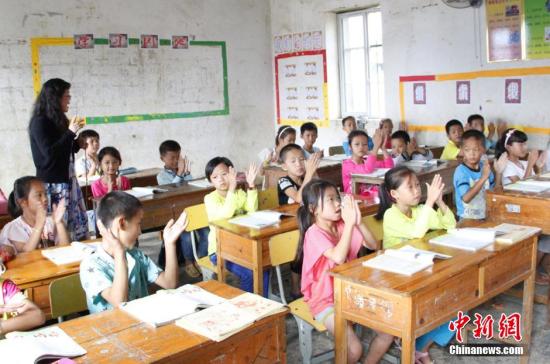China News Service, June 10, according to the Ministry of Education website, the Ministry of Education has recently issued a "Notice on the Implementation of the Teachers' Special Plan for the Talent Support Program for Remote Poor Areas, Frontier Ethnic Areas, and Old Revolutionary Areas in 2020" (hereinafter referred to as " Notice"). The "Notice" stated that the national plan for the 2020-2021 school year is to select 22,842 teachers to support remote poverty-stricken areas, border ethnic areas and old revolutionary bases.
Data map: classrooms in rural elementary schools. Photo by Zhu Liurong
According to the "Notice", the scope of assistance includes the contiguous destitute areas determined by the state, key counties for national poverty alleviation and development work, key counties for provincial poverty alleviation and development work, and other deeply impoverished areas identified by various regions, and the difficult field of the Xinjiang Production and Construction Corps. The "three districts and three states" and other deeply impoverished areas, especially those in poverty-stricken uncapped counties, are inclined. Provinces are not allowed to send teachers supporting education to non-poor areas.
The "Notice" proposes that 22,842 teachers will be selected nationwide in the 2020-2021 school year, of which 21,635 will be selected for the compulsory education stage and 1,207 will be selected for the non-compulsory education stage. Each project province should optimize the allocation of quotas within the province, increase cross-county and cross-regional city selection, fully mobilize the high-quality resources of provincial capitals and central cities, and strengthen support for the uncapped poor counties under its jurisdiction.
The "Notice" makes it clear that in principle, key teachers with intermediate and higher professional technical positions should be selected. Kindergarten teachers can relax the conditions appropriately. School administrators should have strong organizational leadership skills and rich school management experience. The level of Putonghua teachers must meet the national standards and use the national common language for teaching. Education support provides services to the recipients in the form of full-time work for a period of one year. Encourage extension of education support time or stay in work. Carry out selection work according to the school year.
The special job plan for school teachers for internship support in college students and rural compulsory education is not included in the selection. Short-term grass-roots tour lectures, teaching support, and probationary period teachers are not included in the selection.
The "Notice" pointed out that teachers and education managers should be selected in the form of "group formation". Full-time teachers mainly undertake the tasks of subject teaching and class management, organize teaching and research activities to carry out business training and teaching guidance, give full play to the role of backbone demonstrations, form teaching teams with local teachers, and drive the aided schools to improve the overall teaching level and education management ability of the recipient schools. The management personnel are mainly engaged in school management, and promote the aided schools to comprehensively improve the level of education, teaching and management. Aided schools should organize teachers, administrators and supporting teachers to follow up with the students.
Teachers are mainly dispatched by the provinces (autonomous regions and municipalities) and the Xinjiang Production and Construction Corps within the scope of this administrative area, mobilizing high-quality teacher resources in the capital cities, central cities and non-recipient counties to support the aided counties in the province. Provinces with large numbers of remote poverty-stricken areas, frontier ethnic areas, and old revolutionary bases and counties can appropriately relax the conditions for sending teachers and take the form of cities supporting counties and counties supporting townships.
The "Notice" states that provinces with relatively weak human resources can be resolved through assistance to Xinjiang, Tibet, and youth assistance mechanisms, as well as through channels such as cooperation in poverty alleviation, counterpart assistance, and pair assistance.

